Federal Minister of Agriculture
Özdemir: EU rules enable farmers to grow more wheat
Harvested wheat field near Duisburg. Photo: Martin Gerten/dpa
© dpa-infocom GmbH
Russia’s war against Ukraine is having an impact on the international agricultural markets: quantities are threatening to become scarcer, prices are rising. How could German farmers also grow additional grain?
In view of the tense grain markets caused by the war in Ukraine, Federal Minister of Agriculture Cem Özdemir is working to postpone EU-wide requirements for changing arable crops.
“This would allow our farmers to produce more wheat,” he told the partner newspapers of the Neue Berliner Redaktionsgesellschaft and the “Stuttgarter Zeitung”/”Stuttgarter Nachrichten” (Wednesday). “Otherwise it would not be possible to grow more wheat on wheat during this autumn sowing,” said the Green politician. The farmers’ association welcomed the plans, but others would have to follow.
Specifically, it is about 2023 effective EU regulations, according to which the cultivation of the same crop two years in a row on the same area for soil protection is no longer possible. As a rule, maize or rapeseed would then have to be grown in the following year after wheat. As a result of the war in Ukraine, which is a major exporter of wheat, international markets are tight and prices are rising. In addition, energy and fertilizer costs are rising.
Özdemir said he was lobbying Brussels for this arrangement to be postponed. According to the ministry, the EU Commission should determine that this regulation does not have to be fulfilled until 2024 – and not as early as 2023 compared to this year. This would make farmers’ planning much easier without any significant negative impact on climate protection or biodiversity.
Özdemir emphasized: “The advantage is that we get the few areas for species protection. Because once these areas of diversity have disappeared, there is nothing left to protect.” The major task of this time is: “Security of supply and climate protection and species protection. We have to be measured by that.”
Farmers welcome the Ministry’s initiative
Farmer President Joachim Rukwied said: “We want to be able to continue growing bread wheat to the same extent as before.” The association therefore welcomes the ministry’s initiative. “But that can only be a first step. We are now awaiting proposals from Brussels and Berlin on how to solve the food crisis.” Winter wheat, which is sown in autumn, is the most important German cereal.
To relieve the farmers, Özdemir has already made it possible, among other things, that grass and plants from certain “ecological priority areas” may be used as fodder this year. This should mitigate price increases. However, he opposes further demands from the federal states to be able to do everything again on fallow land and to grow grain there, for example.
The Bundestag should debate the situation and possible countermeasures in a current hour on Wednesday. Under the title “Avoid hunger – produce more food instead of shutting down arable land” she had applied for the Union faction.

